Imperial legend Richardson retires

One of Imperial's most popular and respected senior academics, Professor Stephen Richardson, retires after 40 years at the College.
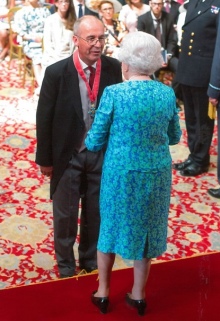 You were awarded a CBE this year for ‘services to chemical engineering education and safety’. When was the investiture and how did it go?
You were awarded a CBE this year for ‘services to chemical engineering education and safety’. When was the investiture and how did it go?
It was on 17 July at Windsor Castle; the weather was nice and it was a delightful occasion. It was Her Majesty the Queen who conducted the investiture and she was excellent. To stand and talk to awardees for over an hour at the age of 89 years is really quite admirable. There is a huge diversity of people there for very different reasons, and she looked genuinely interested in all of them – even me! And I really don’t think you could feign it for that long. As many people know, I don’t always get tongue-tied but I certainly did when it came to my turn. An aide makes the introduction for Her Majesty and you get 45 seconds to talk – but I managed to cram enough in.
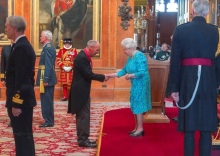 Did you get talking to any notable or famous fellow honoraries?
Did you get talking to any notable or famous fellow honoraries?
Well there are different waiting rooms for the MBEs and OBEs, so it was mostly service people and diplomats, who all seemed to know each other. I was left with a smaller group, which was fine as I got chatting to the charismatic actor Sir John Hurt, who told a joke too colourful for publication, but I’d be happy to repeat it in private, perhaps at my retirement party, if anyone should wish to hear it.
What are your key personal highlights and achievements at Imperial?
The first point to make is that nearly all of them were collective achievements. Everything that has worked in my time at the College has done so because enough of us thought it was the right thing to do at the right time. You can be the right person in the right place at the wrong time and you can be as right as possible and it won’t work. You have to have all the components in place and I’ve been very lucky in that regard.
What I’m most proud of recently is getting teaching back into academic promotions – although there is more work to do in this respect. The government is taking more interest teaching, and quite rightly so. I still think teaching is as important as research in terms of our reputation and what we do for the world. And I’m unapologetic about that, despite a few detractors along the way.
I’ve worked with some really great colleagues. But I feel slightly sorry that I became a Fellow of the Royal Academy of Engineering while my colleague with whom I worked all along missed out, then I got a CBE and my colleague missed out again. I’d have liked to have been able to share those awards more. It wasn’t all me - it certainly wasn’t.
Can you recall any bizarre or humorous moments in your 40 years here?
I tend to see humour all over the place otherwise you tend to start crying.
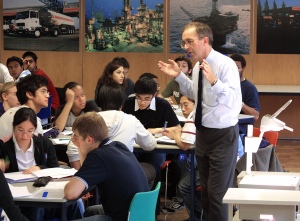
Stephen takes a Chemical Engineering class
I remember when we had 12 fire engines outside the Chemical Engineering Department in the enclosed courtyard. There was a waste bin outside which had a long list of things which we were permitted to dispose of within. However, the waste company had never tried mixing x, y and z together – and it produced some hydrogen cyanide gas in small quantities. The problem was that everyone in the surrounding buildings was sticking their heads out of the windows to see what was going on in the courtyard, perhaps understandably – but I had to yell in very colourful language to shut those ‘darn’ windows immediately. In the end the fire engines used it as a practice for a chemical attack in London – so a good outcome, sort of!
Once I regrettably had to get a student ejected from a lecture by security and then the police after he started acting violently and unpredictably, seeming under the influence of certain unknown substances. The problem was, he was an extremely big chap. Security said they’d send someone along but I insisted on no less than five – one for each limb and one around the torso. And we needed all five in the end. His father was mortified and came and apologised. Of course, over the span of 40 years such incidents are vanishingly rare.
Have you had any notable mentors?
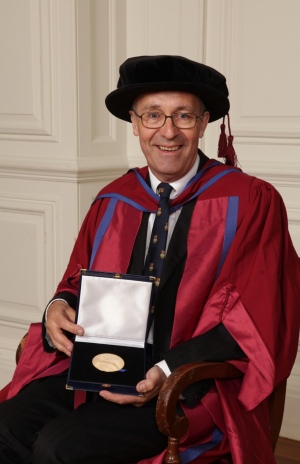
Stephen received the Imperial College Medal in 2015
Certainly. I was lucky to work with Professor Anthony Pearson – and former Deputy Rector Sir Bill Wakeham, both of whom worked in Chemical Engineering. They really taught me what it’s all about.
Also, I took one of the early courses that Professor Sinclair Goodlad (Electrical and Electronic Engineering) put on for new lecturers and that was a fantastic group of people, many of whom I’ve kept up with to this day. We were kind of a self-help team, so we’d be able to ask each other things when we couldn’t admit to our immediate colleagues that we didn’t know what the hell we were doing!
Any students that you’re particularly proud of?
All of them! I’m proud of some 3500 undergraduates by my rough count. Or the vast majority at least. Several are coming to my retirement party which I’m very pleased about.
If I have to name names, then Toru Sato, now a Professor and Head of Department at the University of Tokyo, is unique in many ways.
He came to Imperial to study a PhD and his English was very poor – yet after 3 years he wrote the best PhD thesis I have ever seen. Virtually no corrections were needed. He and his wife came here from Japan, and I’m told they did not speak Japanese to each other; they just knuckled down and learned English. To have that singleness of purpose is incredible. I’ve written more papers with Toru than anyone but Sir Bill. He was a lovely chap too. In the first term I’d ask if he was happy with something and he’d just say ‘yes,’ and would then ask: ‘is that yes, yes, or yes, no?’ By the end he knew he could disagree with me on certain things. Culturally that was very difficult for him.
Any regrets?
I’m sorry I am going early. I think if I hadn’t had the heart operation I would be staying on. But I just get tired too quickly now – and I’ve always done things fast. I hate being anything other than busy, so it’s best to step away. It’s not so much the College but rather the commuting. I’ll still be doing some teaching in Chemical Engineering and getting more involved in education through the Royal Academy of Engineering where I sit on a subcommittee.
Apart from an early stint at Cambridge you’ve been at Imperial all your career (see timeline, right). Were you ever tempted to go and lead another institution as Sir Bill did as VC at the University of Southampton?
I thought of moving away and two universities did try to get me – but I don’t for one minute regret staying here. Imperial is really unique.
What else will you be doing?
Much to my wife’s delight I’ll be busy and out of her hair with consulting work through ICON (Imperial College Consultants). Earlier this year, US firm AspenTech acquired the BLOWDOWN software technology developed by myself and Dr Graham Saville at Imperial for modelling depressurization in oil and gas process plants. Graham and I have a royalty-free licence to use it ourselves until we drop dead, which we intend to do. AspenTech can do the simpler bits for the next few years, but they’ll take some time to pick up the hard bits – it’s taken us 30 years. So we’ll gradually transfer the knowledge over.
I also intend to do more gardening and walking. I like coastal walks although not with high cliffs as I suffer vertigo. Plus I’ve largely lost sight in one eye, so I can’t get too close to the edge on one side ‘Where’s the sea, where’s the sea? − Oh there it is, coming closer!' So I’ll stay well far from the edge. I think I’ll enjoy going on long walks more now anyway. Previously I always felt guilty as I’d have so much work that had to be finished. Well not from the 1st of January.
There will be a celebration for Stephen on Wednesday 16th December 2015 at 5.00pm at the South Kensington Campus. For more information email kathryn.clark@imperial.ac.uk
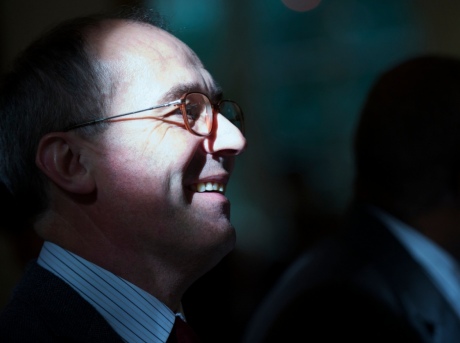
Article text (excluding photos or graphics) © Imperial College London.
Photos and graphics subject to third party copyright used with permission or © Imperial College London.
Reporter
Andrew Czyzewski
Communications Division